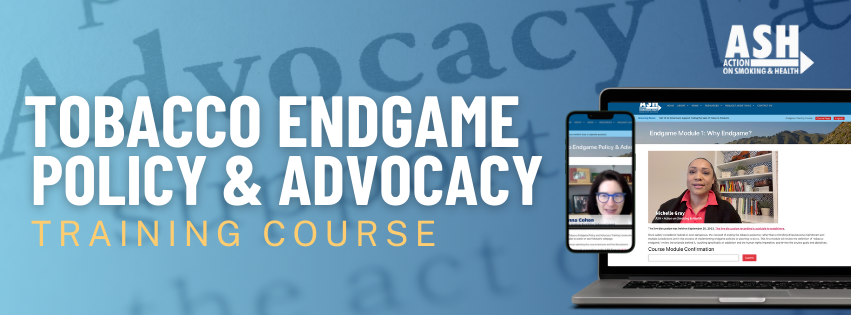Course Registration is open here>
Module |
Name of Module |
Presenter(s) |
Description |
1 |
Why Endgame? |
Chris Bostic (Policy Director, Action on Smoking and Health)
Marita Hefler (Associate Professor, Menzies School of Health Research) Kelsey Romeo-Stuppy (Managing Attorney, Action on Smoking and Health) |
Once widely considered radical or even dangerous, the concept of ending the tobacco epidemic rather than controlling it has become mainstream and multiple jurisdictions are in the process of implementing endgame policies or planning to do so. This first module will review the definition of “tobacco endgame,” review the rationale behind it, touching specifically on addiction and the human rights imperative, and review the course goals and objectives. |
2 |
Potential Endgame Policies |
Janet Hoek (Professor, University of Otago)
Anaru Waa (Research Associate Professor, University of Otago) Richard Edwards (Professor, University of Otago) |
Researchers involved in New Zealand’s ground-breaking endgame law will review possible policy pathways to achieve tobacco endgame, including retailer reduction, nicotine reduction, birthdate-based sales bans and banning cigarette filters. Other novel approaches will also be discussed. |
3 |
Breaking Society’s Addiction and Deconstructing Norms |
Ruth Malone (Professor, University of California-San Francisco) | This module will focus on breaking humanity’s ties to tobacco products and rewriting the narrative away from tobacco as a “normal” part of society. Issues discussed include government reliance on tobacco taxes, the retail environment, and industry entrenchment and interference. |
4 |
Legal Considerations |
Micah Berman (Professor, Ohio State University) | Among the most common responses to the concept of tobacco endgame is its legality. Ending the tobacco epidemic is entirely within the scope of government sovereignty. This session will review legal issues including preemption, international trade law, national constitutions and human rights obligations. |
5 |
Sustainable Development Goals and the Non-Communicable Disease Global Action Plan |
Ulysses Dorotheo (Executive Director, Southeast Asia Tobacco Control Alliance) | Tobacco endgame is vital to achieving two important globally-agreed United Nations initiatives: the Sustainable Development Goals and the Non-Communicable Disease Global Action Plan. This session will review the impact of tobacco use on global health and poverty and how governments can achieve their individual goals by ending the tobacco epidemic. |
6 |
Environment |
Thomas Novotny (Professor Emeritus at San Diego State University School of Public Health) | Globally cigarette filters are the number one source of pollution and plastic pollution, and the amount of e-cig waste dumped into the environment is climbing at an alarming rate. The Earth can’t afford this damage, particularly from a product that kills over eight million people a year. This session will review the environmental aspects of the tobacco epidemic. |
7 |
Polling and Research |
Stacey Gagosian (Vice President, Public Policy, Truth Initiative)
Adrian Bertrand (Research Associate, Truth Initiative) |
The general public, when prompted, is far ahead of decision makers and even public health advocates when it comes to tobacco endgame. This session reviews the polling that has already been done and discusses how public support can be translated into action. |
8 |
Strategic Planning |
Laurent Huber (Executive Director, Action on Smoking and Health) | Every campaign needs a plan, and tobacco endgame is no exception. This session will put traditional advocacy planning methodology in the context of endgame. |
9 |
Communications |
Megan Manning (Associate Director of Communications, Action on Smoking and Health) | There is no need for more research on the harms of tobacco, and there is a growing body of evidence for endgame policies. While more research is undoubtedly needed, perhaps the most important part of moving forward is communications. This session will review endgame messaging, creating champions and dealing with the media. |
Live Discussion Dates |
Time |
Register Here |
May 22, 2025 |
Completed | Watch Recording> |
July 14, 2025 |
8:00am PT / 11:00am ET / 15:00 GMT | Register to Attend> |
September 22, 2025 |
8:00am PT / 11:00am ET / 15:00 GMT | Register to Attend> |
November 3, 2025 |
8:00am PT / 11:00am ET / 15:00 GMT | Register to Attend> |


